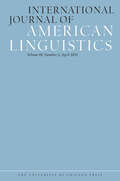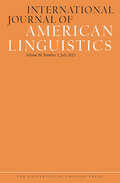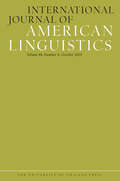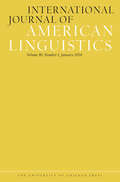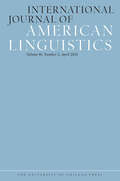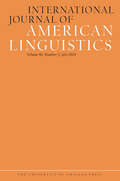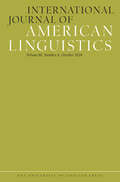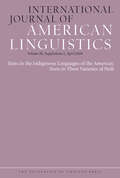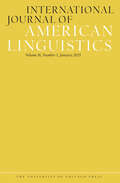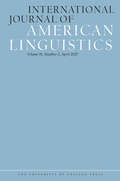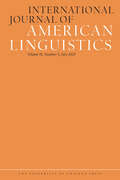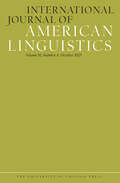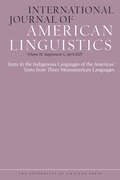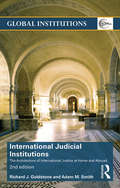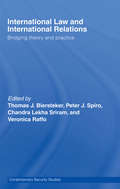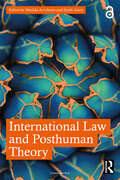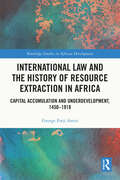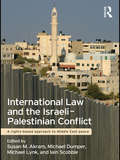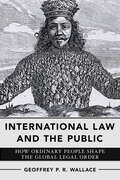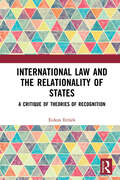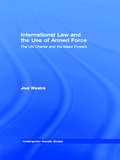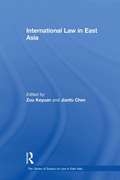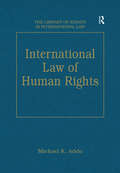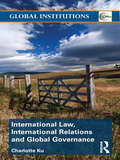- Table View
- List View
International Journal of American Linguistics, volume 89 number 2 (April 2023)
by International Journal of American LinguisticsThis is volume 89 issue 2 of International Journal of American Linguistics. The International Journal of American Linguistics (IJAL) is dedicated to the documentation and analysis of the indigenous languages of the Americas. Founded by Franz Boas and Pliny Earle Goddard in 1917, the journal focuses on the linguistics of American Indigenous languages. IJAL is an important repository for research based on field work and archival materials on the languages of North and South America.
International Journal of American Linguistics, volume 89 number 3 (July 2023)
by International Journal of American LinguisticsThis is volume 89 issue 3 of International Journal of American Linguistics. The International Journal of American Linguistics (IJAL) is dedicated to the documentation and analysis of the indigenous languages of the Americas. Founded by Franz Boas and Pliny Earle Goddard in 1917, the journal focuses on the linguistics of American Indigenous languages. IJAL is an important repository for research based on field work and archival materials on the languages of North and South America.
International Journal of American Linguistics, volume 89 number 4 (October 2023)
by International Journal of American LinguisticsThis is volume 89 issue 4 of International Journal of American Linguistics. The International Journal of American Linguistics (IJAL) is dedicated to the documentation and analysis of the indigenous languages of the Americas. Founded by Franz Boas and Pliny Earle Goddard in 1917, the journal focuses on the linguistics of American Indigenous languages. IJAL is an important repository for research based on field work and archival materials on the languages of North and South America.
International Journal of American Linguistics, volume 90 number 1 (January 2024)
by International Journal of American LinguisticsThis is volume 90 issue 1 of International Journal of American Linguistics. The International Journal of American Linguistics (IJAL) is dedicated to the documentation and analysis of the indigenous languages of the Americas. Founded by Franz Boas and Pliny Earle Goddard in 1917, the journal focuses on the linguistics of American Indigenous languages. IJAL is an important repository for research based on field work and archival materials on the languages of North and South America.
International Journal of American Linguistics, volume 90 number 2 (April 2024)
by International Journal of American LinguisticsThis is volume 90 issue 2 of International Journal of American Linguistics. The International Journal of American Linguistics (IJAL) is dedicated to the documentation and analysis of the indigenous languages of the Americas. Founded by Franz Boas and Pliny Earle Goddard in 1917, the journal focuses on the linguistics of American Indigenous languages. IJAL is an important repository for research based on field work and archival materials on the languages of North and South America.
International Journal of American Linguistics, volume 90 number 3 (July 2024)
by International Journal of American LinguisticsThis is volume 90 issue 3 of International Journal of American Linguistics. The International Journal of American Linguistics (IJAL) is dedicated to the documentation and analysis of the indigenous languages of the Americas. Founded by Franz Boas and Pliny Earle Goddard in 1917, the journal focuses on the linguistics of American Indigenous languages. IJAL is an important repository for research based on field work and archival materials on the languages of North and South America.
International Journal of American Linguistics, volume 90 number 4 (October 2024)
by International Journal of American LinguisticsThis is volume 90 issue 4 of International Journal of American Linguistics. The International Journal of American Linguistics (IJAL) is dedicated to the documentation and analysis of the indigenous languages of the Americas. Founded by Franz Boas and Pliny Earle Goddard in 1917, the journal focuses on the linguistics of American Indigenous languages. IJAL is an important repository for research based on field work and archival materials on the languages of North and South America.
International Journal of American Linguistics, volume 90 number S1 (April 2024)
by International Journal of American LinguisticsThis is volume 90 issue S1 of International Journal of American Linguistics. The International Journal of American Linguistics (IJAL) is dedicated to the documentation and analysis of the indigenous languages of the Americas. Founded by Franz Boas and Pliny Earle Goddard in 1917, the journal focuses on the linguistics of American Indigenous languages. IJAL is an important repository for research based on field work and archival materials on the languages of North and South America.
International Journal of American Linguistics, volume 91 number 1 (January 2025)
by International Journal of American LinguisticsThis is volume 91 issue 1 of International Journal of American Linguistics. The International Journal of American Linguistics (IJAL) is dedicated to the documentation and analysis of the indigenous languages of the Americas. Founded by Franz Boas and Pliny Earle Goddard in 1917, the journal focuses on the linguistics of American Indigenous languages. IJAL is an important repository for research based on field work and archival materials on the languages of North and South America.
International Journal of American Linguistics, volume 91 number 2 (April 2025)
by International Journal of American LinguisticsThis is volume 91 issue 2 of International Journal of American Linguistics. The International Journal of American Linguistics (IJAL) is dedicated to the documentation and analysis of the indigenous languages of the Americas. Founded by Franz Boas and Pliny Earle Goddard in 1917, the journal focuses on the linguistics of American Indigenous languages. IJAL is an important repository for research based on field work and archival materials on the languages of North and South America.
International Journal of American Linguistics, volume 91 number 3 (July 2025)
by International Journal of American LinguisticsThis is volume 91 issue 3 of International Journal of American Linguistics. The International Journal of American Linguistics (IJAL) is dedicated to the documentation and analysis of the indigenous languages of the Americas. Founded by Franz Boas and Pliny Earle Goddard in 1917, the journal focuses on the linguistics of American Indigenous languages. IJAL is an important repository for research based on field work and archival materials on the languages of North and South America.
International Journal of American Linguistics, volume 91 number 4 (October 2025)
by International Journal of American LinguisticsThis is volume 91 issue 4 of International Journal of American Linguistics. The International Journal of American Linguistics (IJAL) is dedicated to the documentation and analysis of the indigenous languages of the Americas. Founded by Franz Boas and Pliny Earle Goddard in 1917, the journal focuses on the linguistics of American Indigenous languages. IJAL is an important repository for research based on field work and archival materials on the languages of North and South America.
International Journal of American Linguistics, volume 91 number S1 (April 2025)
by International Journal of American LinguisticsThis is volume 91 issue S1 of International Journal of American Linguistics. The International Journal of American Linguistics (IJAL) is dedicated to the documentation and analysis of the indigenous languages of the Americas. Founded by Franz Boas and Pliny Earle Goddard in 1917, the journal focuses on the linguistics of American Indigenous languages. IJAL is an important repository for research based on field work and archival materials on the languages of North and South America.
International Judicial Institutions: The architecture of international justice at home and abroad (Global Institutions)
by Richard J. Goldstone Adam M. SmithThis fully-updated and much expanded second edition provides a much needed, short and accessible introduction to the current debates in international humanitarian law. Written by a former UN Chief Prosecutor and a leading international law expert, this book analyses the legal and political underpinnings of international judicial institutions, it provides the reader with an understanding of both the historical development of institutions directed towards international justice, as well as an overview of the differences and similarities between such organizations. New to this edition: New updates on recently found records of the United Nations War Crimes Commission. Updates on the recent judicial decisions of the International Criminal Tribunal for the former Yugoslavia and International Criminal Tribunal for Rwanda Updates on the Special Tribunal For Lebanon A re-evaluation of the future of the International Criminal Court International Judicial Institutions: Second Edition will be of great interest to students of International Politics, Criminology and Law.
International Law and International Relations: Bridging Theory and Practice (Contemporary Security Studies #90)
by Thomas J. Biersteker Chandra Lekha Sriram Peter J. Spiro Veronica RaffoThis unique volume examines the opportunities for, and initiates work in, interdisciplinary research between the fields of international law and international relations; disciplines that have engaged little with one another since the Second World War. Written by leading experts in the fields of international law and international relations, it argues that such interdisciplinary research is central to the creation of a knowledge base among IR scholars and lawyers for the effective analysis and governance of macro and micro phenomena. International law is at the heart of international relations, but due to challenges of codification and enforceability, its apparent impact has been predominantly limited to commercial and civil arrangements. International lawyers have been saying for years that 'law matters' in international affairs and now current events are proving them right. International Law and International Relations makes a powerful contribution to the theory and practice of global security by initiating a research agenda, building an empirical base and offering a multidisciplinary approach that provides concrete answers to real-world problems of governance. This book will be of great interest to all students of international law, international relations and governance.
International Law and Posthuman Theory
by Emily Jones Matilda ArvidssonAssembling a series of voices from across the field, this book demonstrates how posthuman theory can be employed to better understand and tackle some of the challenges faced by contemporary international law.With the vast environmental devastation being caused by climate change, the increasing use of artificial intelligence by international legal actors and the need for international law to face up to its colonial past, international law needs to change. But in regulating and preserving a stable global order in which states act as its main subjects, the traditional sources of international law – international legal statutes, customary international law, historical precedents and general principles of law – create a framework that slows down its capacity to act on contemporary challenges, and to imagine futures yet to come. In response, this collection maintains that posthuman theory can be used to better address the challenges faced by contemporary international law. Covering a wide array of contemporary topics – including environmental law, the law of the sea, colonialism, human rights, conflict and the impact of science and technology – it is the first book to bring new and emerging research on posthuman theory and international law together into one volume.This book’s posthuman engagement with central international legal debates, prefaced by the leading scholar in the field of posthuman theory, provides a perfect resource for students and scholars in international law, as well as critical and socio-legal theorists and others with interests in posthuman thought, technology, colonialism and ecology.Chapters 1, 9 and 11 of this book is freely available as a downloadable Open Access PDF at http://www.taylorfrancis.com under a Creative Commons Attribution-Non Commercial-No Derivatives (CC-BY-NC-ND) 4.0 license.
International Law and the Arctic
by Michael Byers James BakerClimate change and rising oil prices have thrust the Arctic to the top of the foreign policy agenda and raised difficult issues of sovereignty, security and environmental protection. Improved access for shipping and resource development is leading to new international rules on safety, pollution prevention and emergency response. Around the Arctic, maritime boundary disputes are being negotiated and resolved, and new international institutions, such as the Arctic Council, are mediating deep-rooted tensions between Russia and NATO and between nation states and indigenous peoples. International Law and the Arctic explains these developments and reveals a strong trend towards international cooperation and law-making. It thus contradicts the widespread misconception that the Arctic is an unregulated zone of potential conflict.
International Law and the History of Resource Extraction in Africa: Capital Accumulation and Underdevelopment, 1450-1918 (Routledge Studies in African Development)
by George Forji AminThis book investigates the historical economic and legal regimes that legitimated the resource extraction and exploitation of Africa between the 15th and 19th centuries and led to the continent’s trajectory of underdevelopment in the world system. The book interrogates the economic and legal structures that supported European intervention in Africa. It explores the trade and private property rights which were to shape the economic future of the continent, most notably the trade in human beings as legitimate private property by European powers. The book then looks at the techniques used to submerge African sovereignty under European sovereignty during the scramble for territorial control in the 19th century, concluding with the validation of occupation in international law following the 1884-85 Berlin Conference. The book argues that the doctrines of trade and property rights sanctioned by international law led to a trend of African dispossession that set the continent on a path to underdevelopment, with long-reaching consequences. This book will be of interest to researchers and students across law, history, economics, international relations, and African studies.
International Law and the Israeli-Palestinian Conflict: A Rights-Based Approach to Middle East Peace
by Susan M. AkramThe Israeli-Palestinian conflict has long been intertwined with, and has had a profound influence on, the principles of modern international law. Placing a rights-based approach to the Israeli-Palestinian conflict at the centre of discussions over its peaceful resolution, this book provides detailed consideration of international law and its application to political issues. Through the lens of international law and justice, the book debunks the myth that law is not useful to its resolution, illustrating through both theory and practice how international law points the way to a just and durable solution to the conflict in the Middle East. Contributions from leading scholars in their respective fields give an in-depth analysis of key issues that have been marginalized in most mainstream discussions of the Israeli-Palestinian conflict: Palestinian refugees Jerusalem security legal and political frameworks the future of Palestine. Written in a style highly accessible to the non-specialist, this book is an important addition to the existing literature on the subject. The findings of this book will not only be of interest to students and scholars of Middle Eastern politics, International Law, International Relations and conflict resolution, but will be an invaluable resource for human rights researchers, NGO employees, and embassy personnel, policy staffers and negotiators.
International Law and the Public: How Ordinary People Shape the Global Legal Order
by Geoffrey P. WallaceIn International Law and the Public, Geoffrey P.R. Wallace investigates the public as a crucial, often overlooked, actor in international law. He asks just who is it that counts in the operation of the international legal order. Defying conventional wisdom that sees governments, leaders, generals, lawyers, or elites from the upper echelons of society as the main international legal players, Wallace advances a "popular international law" where ordinary people are considered important legal actors in their own right alongside the usual focus on elites. Far from powerless or unwitting, publics possess both the cognitive and material capacities to understand and contribute to the intricacies of international legal rules. Combining rigorous theorizing with wide-ranging evidence, International Law and the Public is an account of an international legal politics from below, taking seriously the place of ordinary people in international affairs.
International Law and the Relationality of States: A Critique of Theories of Recognition
by Erdem ErtürkThis book critically engages with theories of the recognition of states under international law. Demonstrating that recognition is a constitutive relation that is imperative for the construction of international subjects, the book argues that prevalent theories of recognition fall short of accommodating this imperative. The book traces the source of this shortcoming to Vattel’s notion of absolute sovereignty. A paradox pertains to this notion as absolutely independent states seemingly come into being in a community which sets the law that determines statehood. The book shows how this paradox is reproduced in constitutive theorists’ idea of recognition as a sovereign gesture of consent and declarative theorists’ perception that states can come into being on a singular basis, without any need for interaction. This necessitates a rethinking of the role of recognition in a way that circumvents the problems generated by the notion of absolute independence, whilst accommodating the relational element of coming into being. To achieve this purpose, the book draws upon Hegel’s theory of recognition, supplementing it with Bataille’s and Derrida’s critical readings of Hegel’s thought. In this respect, the book departs from the restrictive economy of recognition that constantly recreates a paradoxical perception of sovereignty, elaborating a more general economy of recognition that accommodates the notion of subjects in flux. This critical engagement with a key notion in international law will appeal to legal and political theorists, as well as scholars and students in international relations.
International Law and the Use of Armed Force: The UN Charter and the Major Powers (Contemporary Security Studies)
by Joel WestraSince the UN Charter came into effect in 1945, there have been numerous incidents in which one or more of the five major powers (at least arguably) violated the Charter's Article 2(4) prohibition of force. Such incidents notwithstanding, this book demonstrates how the Charter restrains the major powers' military actions. As an instrument of international order, the Charter provides a framework of legal rules restricting the use of armed force. Although these rules are subject to auto-interpretation by the major powers (as a consequence of their veto), they create an expectation of compliance that subjects the major powers' military actions to international scrutiny. To reduce the likelihood of resistance from states threatened by such actions, major powers exercise prudential restraint, altering the manner and timing of their military actions in accordance with the legal arguments offered to justify those actions as consistent with the Charter and therefore not threatening to the existing international order. The book evaluates the efficacy of the Charter using large-N methods and five case studies: US intervention in the Caribbean, 1953–61; Anglo- French intervention in Egypt, 1956; Soviet intervention in Hungary, 1956; US–British intervention in Iraq, 1990–98; and US–British intervention in Iraq, 1999–2003. The book's extensive focus on the two Iraq cases provides a basis for timely evaluation of the continuing salience and possible reforms of the UN Charter system. This book will be of much interest to students of security studies, the UN, international law, and international relations.
International Law in East Asia: Issues And Prospects (The\library Of Essays On Law In East Asia Ser.)
by Zou KeyuanAs the worlds political and economic landscape changes in response to the rise of Asian countries such as China, so Asian influences on the global legal order will become more pronounced. Many countries in the region, such as Japan and South Korea, influence the development of international law in various ways, either individually or collectively through multinational organisations such as ASEAN. This collection of published work by leading East Asian scholars covers Asian perspectives concerning various issues in international law, ranging from general perspectives to particular themes such as international economic law, international human rights law, international ocean law, international criminal law, international security law and international dispute settlement. For the first time it provides a comprehensive picture of how and why East Asian countries participate in international law making, as well as comply with international law in their state practices. In so doing, the editors attempt to address the question whether the rising powers in East Asia will change the existing international legal order in future.
International Law of Human Rights: The Compatibility Approach In The Practice Of International Human Rights Institutions (The\library Of Essays In International Law Ser.)
by K. Addo MichaelInternational law is a social construct crafted by human endeavour to achieve or at least contribute to the achievement of goals perceived to be valuable or necessary to effective social relations. In effect, international law is no more than a facilitative process and so cannot have answers and conclusions of its own other than what lies within the ambitions of those who define the limits of the process. The essays collected together here reveal how international law facilitates the achievement of the long standing ambition of turning human rights ideals and rhetoric into reality.
International Law, International Relations and Global Governance: The International Law And International Relations Toolbox (Global Institutions)
by Charlotte KuInternational Relations and International Law have developed in parallel but distinctly throughout the 20th Century. However in recent years there has been recognition that their shared concerns in areas as diverse as the environment, transnational crime and terrorism, human rights and conflict resolution outweigh their disciplinary and methodological divergences. This concise and accessible volume focuses on collaborative work within the disciplines of international law and international relations, and highlights the need to develop this collaboration further, describing the value for individuals, states, IGOs, and other non-state actors in being able to draw on the cross-pollination of international relations and international legal scholarship. This book: examines how different elements of governance are interacting and shifting from one actor to another analyses the cumulative effect of these shifts, and evaluates how they both enhance and challenge the worlds governing capacity considers how the characteristics of an architecture for a globalized governance are emerging. Helping readers to examine and understand how accumulated actions over time have given rise to system-wide changes, this work is essential reading for all students of international law, international relations and global governance.
